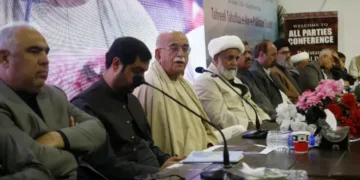The government’s recent attempt to blame internet disruptions on a surge in Virtual Private Network (VPN) usage has sparked a wave of criticism from digital rights advocates, IT experts, and businesses alike. The explanation, offered by State Minister for Information Technology and Telecommunication Shaza Fatima Khawaja, has left many skeptical, raising more questions than it answered.
During a recent press briefing, the minister claimed that a significant increase in VPN usage had strained the country’s internet infrastructure, leading to widespread slowdowns. However, this rationale was quickly dismissed by many in the tech community, who argue that the government’s narrative does not hold up under scrutiny.
Digital Rights Advocate Farieha Aziz was among the most vocal critics, challenging the minister’s explanation directly. “The minister should first explain what has caused this sudden surge in VPN use if not their ban on X and more recently the WhatsApp disruption due to which media could not be transferred or downloaded on data,” Aziz stated. She further pointed out that Meta, the parent company of WhatsApp, had already clarified that there were no issues on their end, implying that the problems were local in origin. “So, what is causing this?” she questioned, highlighting the lack of transparency in the government’s communication strategy.
Aziz also expressed concerns over the government’s shifting narratives regarding internet disruptions. She recalled that the government initially claimed that the firewall was installed for cybersecurity reasons, yet the minister now suggests that no actions were taken to interfere with the internet. “We will see how this claim stands in the days to come,” Aziz remarked, citing a history of conflicting statements from officials, particularly around the blocking of X.
Adding to the critique, IT and digital marketing expert M Tanveer Nandla echoed Aziz’s sentiments, questioning the necessity for VPNs in the first place. He described the minister’s statement as an inadvertent confession, acknowledging that internet disruptions had driven people to use VPNs. “There is a confession in her statement that there was some problem and that is why a large number of people were forced to use VPN,” Nandla argued.
Nandla went further, accusing the government of intentionally disrupting internet services on random IPs and in various regions to create confusion about service availability. He suggested that the government’s actions were politically motivated, aimed at suppressing freedom of expression and controlling dissent. According to Nandla, the slowdown was likely caused by the government’s use of Deep Packet Inspection (DPI) firewalls, which analyze data packets and create bottlenecks, resulting in slower internet speeds.
In addition to digital rights advocates and IT experts, the business community has also voiced concerns. The Pakistan Software Houses Association and the Lahore Chamber of Commerce and Industry (LCCI) have warned of severe repercussions for the IT sector if the disruptions continue. LCCI President Kashif Anwar emphasized the economic impact, stating, “Frequent internet outages, slow speed, and high cost are crippling our economy and hindering our ability to compete in the global market.”
Shahzad Arshad, head of the Wireless and Internet Service Providers Association of Pakistan, also warned of dire consequences, predicting a potential mass exodus of businesses from the country if the situation does not improve. He noted that internet connectivity had slowed by up to 40% over the past month, exacerbating the challenges faced by businesses and the public alike.
As criticism mounts, the government’s explanation for the internet disruptions remains under intense scrutiny, with calls for greater transparency and accountability growing louder.












